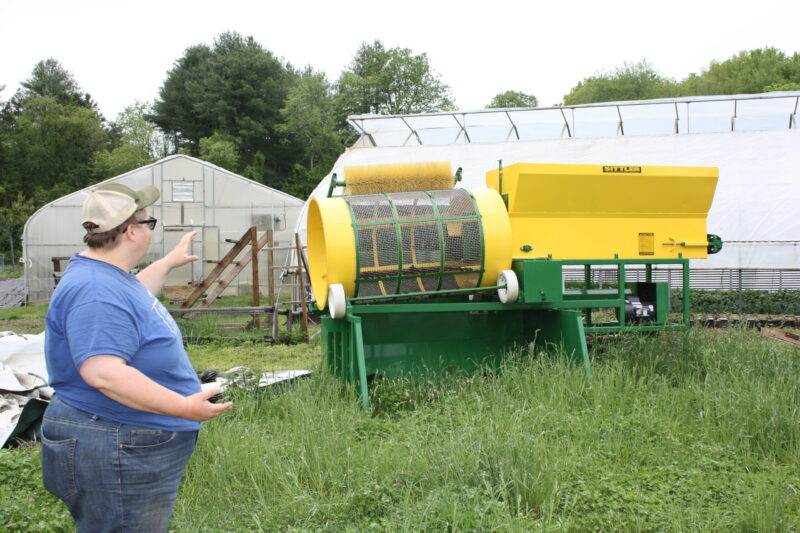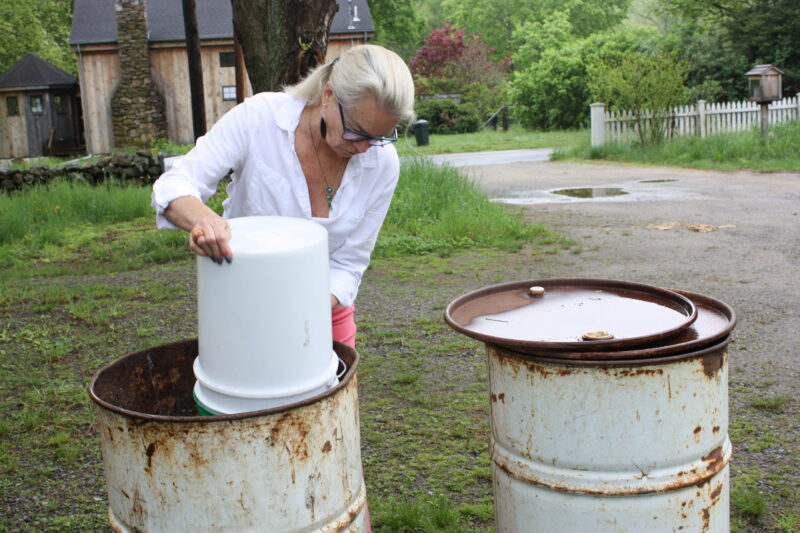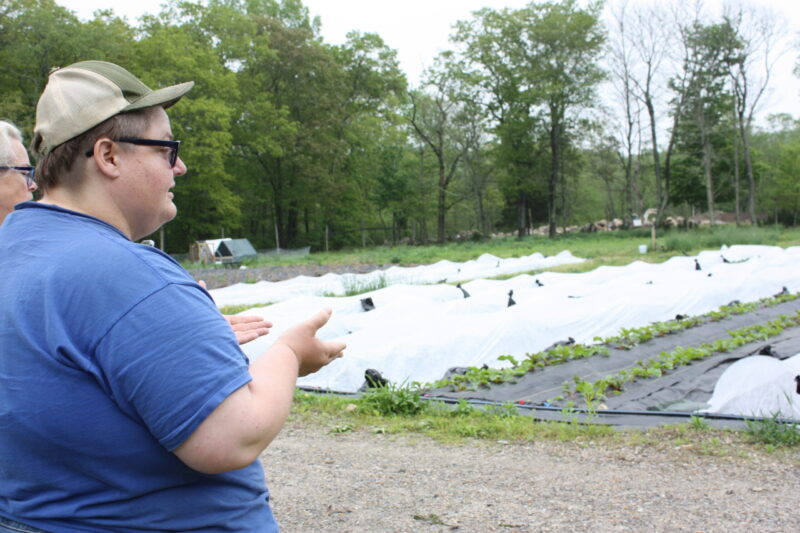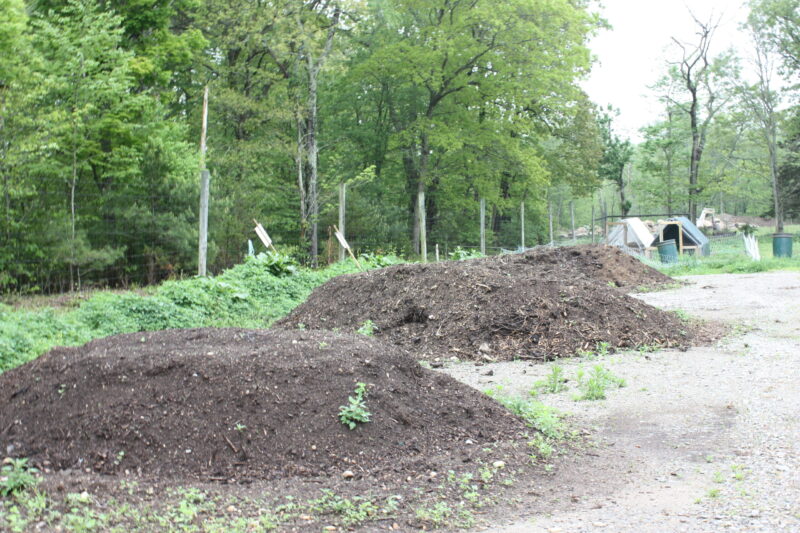Compost Benefits Farm, Lyme Residents, Town’s Bottom Line … and Doesn’t Stink!

LYME, CT—Long Table Farm owner Baylee Drown last week stood alongside several carefully-tended compost piles adjacent to the vegetable fields as food scraps carried in from all over town cooked down in a natural process that she hopes will bring the community-supported agriculture operation into a new era of sustainability.
Common fears about the stench of rotting food and the rodents it attracts were unfounded on that damp Thursday morning as Drown and Lyme Selectwoman Kristina White looked out from the crushed stone pad separating the compost piles from the earth below. Drown said wood chips spread over the piles is a simple and effective way to manage odors.
“My farm does not stink,” she said. “And I don’t want it to stink. I live here. I have a vested interest in it not stinking.”
Drown, who speaks passionately about carbon sequestration and has been known to refer to farm animals as “manure production,” said it’s her goal to be able to turn one million pounds of food scraps and other organic material into 2,000 cubic yards of compost annually.
She currently produces 200 cubic yards per year of compost, which returns to the farm as fertilizer for a wide array of vegetables that have become more abundant because of it.
Drown and her partner, Ryan Quinn, established Long Table Farm 11 years ago. They initially leased the site before purchasing it in 2018. She credited an agricultural conservation easement, which permanently prohibits the land from being developed and thus reduces the appraised value, with keeping the farm affordable to small business owners like them.
Drown said staff members from Lyme Consolidated School have been dropping off two five-gallon buckets of food scraps per day since 2022. The Town of Lyme last year began selling green-lidded, brightly labeled buckets at cost to residents interested in hauling their organic refuse to the farm.
White said the program benefits the farm, the residents of Lyme, and the town’s bottom line.
She noted 20-25% of the weight of solid waste comes from food.
“So if we can reduce the amount of food waste in the solid waste stream, then our costs for the town go down. And it’s probably going to be mandated eventually by the state,” she said.
She counted 40 of the specially-produced buckets that have been sold so far by the town. Drown added that about 140 people drop off scraps in their own buckets.
White said bringing food scraps to the farm is a good option even for those who do their own composting at home. That’s because items like bones, fats, oils and other organics that don’t break down as well in a backyard compost pile are welcome at the farm.

“What we’re trying to say is, ‘Yeah, please compost. Continue to compost in your backyard. But all that other stuff that you’re throwing in the garbage, put it in this bucket,’” she said.
Drown hopes to expand the program through a grant from the state Department of Energy and Environmental Protection as she looks to include Old Lyme in the mix. She said some new farm equipment and expansion of the crushed stone pad would allow the farm to meet the organic recycling needs of both towns, assuming 50% of residents brought in their food scraps.
She also hopes to install collection barrels at places like the transfer station and recycling center.
Drown is asking for $350,000 to $375,000 in funding from the state, combined with in-kind help from the two towns in marketing the composting program and providing educational opportunities.
She told the Lyme Board of Selectpeople at a meeting this week that the grant application has to come from a municipality or the regional Council of Governments since private entities alone are not authorized to apply.
First Selectman David Lahm encouraged Drown to explore a partnership that includes both Lyme and Old Lyme.
“The state government is pushing regionalization,” he said. “So if you can show it’s more than one town, it’s easier to get money.”
Drown said she will be meeting with Lyme-Old Lyme Schools Superintendent Ian Neviaser next week and is lining up a meeting with Old Lyme First Selectwoman Martha Shoemaker.
An Expanded ‘Beta Test’

Back at the farm, Drown described the program as a “beta test” as the farmers work to scale up production to meet demands coming down the pike now that the state is mandating more businesses and organizations recycle their food scraps.
“I think it’s a good system to have a starter program that’s optional. And then get people kind of used to the idea before the mandate comes out,” Drown said.
It’s also a beta test for the public.
Anyone in the area is invited to drop off their scraps Wednesday through Sunday from dawn to dusk in two barrels at the farm entrance.
In addition to the scraps, compost at Long Table Farm comprises leaves, wood chips, animal bedding and manure. Drown and Quinn use their blue farm tractor to haul the collection barrels from the parking area to the piles arranged atop the stone pad.
She said she’s hopeful grant money can cover a grabbing mechanism to tip the barrels from the tractor into the pile so the farmers don’t have to do it by hand.
“Right now, it’s messy and gross,” she said. “But we’re tough.”
Drown said the composting happens as the large piles “cook,” with bacteria and fungi breaking down the material so that heat is released as a byproduct.
The magic number is 131 degrees, according to Drown. That’s the temperature at which pathogens are killed and weed seeds become sterile.
After a trip through the farm’s rotating screener, properly cooked compost emerges as a clean, high quality fertilizer that she said her friends in the farming community are “champing at the bit” to purchase.
She said Connecticut and Rhode Island don’t have a reliable supplier of high-grade compost and potting soil to supply small scale vegetable farmers in the region.
“I’ve made two batches that were totally weed seed free, but not all my batches are that way yet,” she said. “I’m making good compost, but it’s not perfect yet for vegetable farms.”
Drown was optimistic that will change.
“And that’s another part of why this beta testing process is really helpful,” she said. “Because I’m learning by doing.”
She also sees the pilot program as a way to work toward a sustainable model that will eventually include tipping fees like those the town currently pays the Materials Innovation and Recycling Authority to haul solid waste out of town.

In the meantime, Drown said she’s happy to donate the labor and materials she estimated at $3,000 per year to handle food scraps for the town. Her grant application to the state commits to another $50,000 in labor to develop the infrastructure to grow the program.
“And I’m learning how to be a good composter. I took a certificate course so I can operate a compost facility legally that’s recognized in multiple states,” she said. “At some point, the money that’s being given to waste companies needs to be given to farmers.”
White, who also serves as Executive Director of the Lyme Land Trust, was confident the town would start looking into reimbursing farmers for their work when recycling organic material becomes the law.
“Because we’re going to have to pay someone to do it,” she said.
She described the initiative as one that fits into Lyme’s unique, deeply-rooted and pervasive commitment to open space.
“Part of our mission is supporting local farmers and keeping farmland, versus that farmland turning into more development,” she said. “In Lyme, everything is intertwined.”